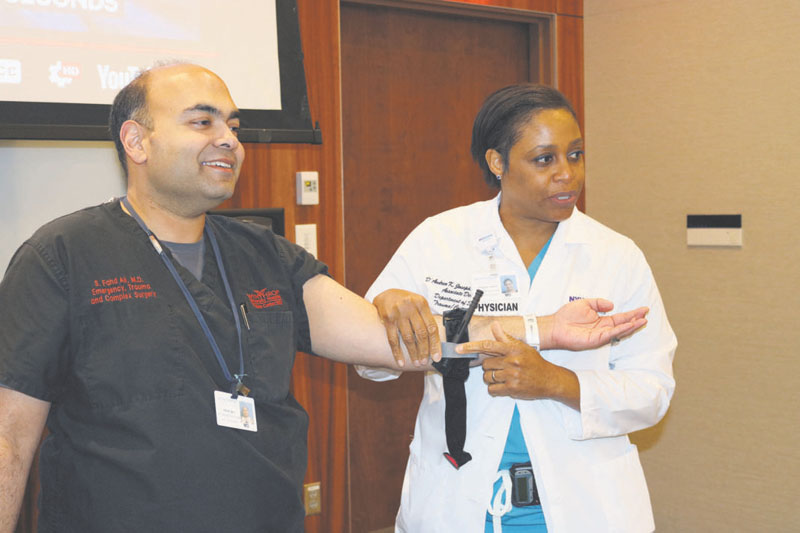Hospital rolls out new program to prepare community response to mass casualties

NYU Winthrop Hospital recently announced that its Stop the Bleed program, which educates first responders in techniques to stop life-threatening bleeding, is now being significantly expanded in an ambitious initiative to teach law enforcement, school educators and other members of the community how to help stop the bleeding that could occur following a mass shooting or terrorist bombing. Stop the Bleed is a national program initiated by the American College of Surgeons and supported by Homeland Security. The program encourages everyday citizens to become trained and empowered to assist in a bleeding emergency before professional medical aid arrives. Bystanders are usually the first on the scene following a calamitous event and best positioned to provide immediate care to sustain life after blood loss. NYU Winthrop will be the first organization in Nassau County to reach into mainstream communities with a Stop the Bleed program, the goal being to create better prepared communities that can help reduce deaths from bleeding. The ambitious program will educate first responders, schools and citizens to take action to treat life-threatening bleeding. It is the long-term goal is to have tourniquet/trauma aid kits everywhere defibrillators are found.
“The most frequent cause of preventable death from extremity injury is bleeding from serious arm and leg wounds,” said Fahd Ali, MD, a lead Trauma Surgeon at NYU Winthrop Hospital and a chief trauma surgeon aligned with the New York State Police. “We as a community have the power to help prevent unnecessary deaths by undergoing Stop the Bleed training. Our hope is that, over time, Stop the Bleed becomes a standard lifesaving program in our communities just like CPR.”
According to a National Academies of Science study, trauma is the leading cause of death for Americans under the age of 46. That trauma includes life-threatening injuries from car accidents, gun violence, mass casualty incidents and terrorism, as well as from home and work injuries. Significant advances in trauma care were developed over the last decade through knowledge gained treating service members in Iraq and Afghanistan, with the percentage of wounded who died from injuries there declining precipitously.
Stop the Bleed applies some of that knowledge to life-threatening bleeding in the civilian population. The program was initiated by a physician who examined the wounds among those killed in the Sandy Hook massacre in Newtown, CT and determined that, if pressure had been immediately applied to some wounds, deaths would have been prevented.
The Stop the Bleed program at NYU Winthrop focuses on teaching tactics to recognize life-threatening bleeding and provide immediate response to control that bleeding, including by direct pressure, the use of tourniquets, or packing (filling) a wound with gauze or clean cloth. The program includes hands-on training, employing the use of dummy body parts and a liquid that resembles blood. Participants learn how to pack wounds and use tourniquets.
NYU Winthrop hosted a pilot program in Stop the Bleed this past summer in response to a boat propeller accident, and recently expanded the initiative. Two-hour training sessions now include local police officers, hospital security guards and parking attendants, with upcoming sessions scheduled to “train the trainers” so that a host of trainers can be dispersed into local communities and schools to teach Stop the Bleed.
“There’s an important need to implement Stop the Bleed across Long Island,” said Collin Brathwaite, MD, FACS, FASMBS, Chairman of the Department of Surgery at NYU Winthrop Hospital. “Knowledge gained by everyday citizens may save countless lives and, as a Hospital with a Level 1 Trauma Center, we view it as a core mission to help
that happen.”
—Submitted by NYU Winthrop Hospital


















